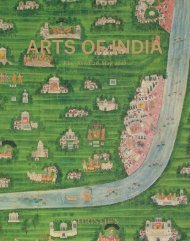1JZGauQ
1JZGauQ
1JZGauQ
Create successful ePaper yourself
Turn your PDF publications into a flip-book with our unique Google optimized e-Paper software.
AN ARCHAEOLOGY OF THE IRON CURTAIN<br />
on the 1 st of October in the evening. The station was full of soldiers to be, all<br />
saying goodbye to their family and friends. The train took off and stopped<br />
in several places along the way letting soldiers on and off. My destination,<br />
Budejovice, was around 700 km away and we arrived here in the afternoon<br />
of the 2 nd of October. At the station there were buses and military lorries<br />
waiting for us. A short time later we were behind the barrack gates. Our<br />
civil clothes were sent home, our hair was cut, after which we showered and<br />
were given our military clothes and equipment. We were also trying to get<br />
to know the other new soldiers. We were then divided into groups such as<br />
dog handlers, drivers, and cooks or, such as I was, a telephone and radio<br />
operator. In the evening we put our clothes and things into the lockers and<br />
our first night in green was about to commence…” (Jozef, 2010, pers.<br />
comm. 14 th November) (Figure 58).<br />
There were different specialisations of border guard such as gunners, dog<br />
handlers, drivers, radio operators, engineers, surveillance technicians and<br />
cooks. Initial training was given at several training facilities such as in<br />
Jemnice which was the training facility for the border guards in the study<br />
area (Tomas, 2010, pers. comm. 14 th October). Here the future border<br />
guards were trained in physical exercise, shooting and gun handling,<br />
military tactics, special border training, political schooling (communist<br />
propaganda) and particular training required for the different specialisation.<br />
This training lasted around 3 months (Marek, 2010 pers. comm.4 th<br />
November). If you were given more specialised training such as to become a<br />
radio and telecommunication operator the training was usually around 6<br />
months (Jozef 2010, pers. comm. 14 th November 2010).<br />
A border guard had approximately 10 days off per year with an extra one<br />
to three days off in order to travel home depending on the distance. The pay<br />
a border guard received was not much more than pocket money but the<br />
guards that served directly on the border were paid a bit extra. This did not<br />
include people at the border guard station, for example cooks that were not<br />
out by the actual border. Work as a border guard could be hard. The guards<br />
schedule followed the following pattern: two days on duty then one day of<br />
training followed by one day off and then it stated all over again. If,<br />
however, the area was under high alert (due to circumstances such as<br />
political disturbances in the country or an important political visit) there<br />
would not be any days off or time for training at all. A working day was 10<br />
hours and 12 during periods of high alert. Work was not, however, limited<br />
to these hours. Marek who worked as a driver with the 12 th Company, 5 th<br />
Brigade at the Chebská border guard station near the border to GDR<br />
142




